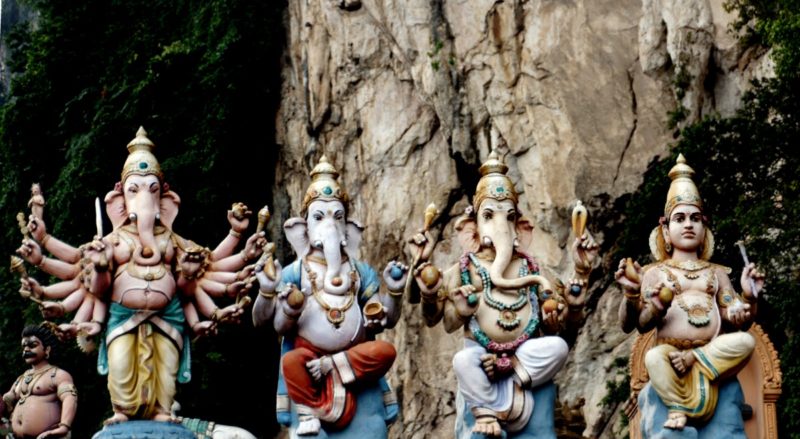The creation is personal because it was made by the personal God
Each worldview, whether it is biblical theism, animism, or secularism, has a story about beginnings, a plot line, and a vision for the future. In fact, every worldview must answer four basic questions: Where did we come from? What went wrong? What is the solution? Where are we going?
The biblical narrative answers these questions with four words: creation, fall, redemption, consummation. The personal God creates, and calls the human, His vice-regent, to care for and develop the creation. But humans rebelled against God, and the creation was marred. People, and all creation, need redemption, which the personal God graciously provides through Jesus Christ. God will bring to fulfillment His purpose for people and the creation.
For materialists, the key to the past, present, and future is evolution. Secularism’s story begins with “In the beginning Nature . . .” Evolution leaves no room for God. All that exists comes from an impersonal mix of matter, energy, time, and chance. There is no purpose in the universe nor any future with transcendent meaning.
Animism recognizes no personal God, but rather, “In the beginning was an  undivided spirit, a Oneness.” The animist believes a process of de-creation, a myriad of gods and humans emerging from “the one.” Life is a series of struggles to be mastered by manipulating the gods, who are capricious and unpredictable. Man’s goal is to be set free from the physical bondage of this world and to return to the unity of spirit.
undivided spirit, a Oneness.” The animist believes a process of de-creation, a myriad of gods and humans emerging from “the one.” Life is a series of struggles to be mastered by manipulating the gods, who are capricious and unpredictable. Man’s goal is to be set free from the physical bondage of this world and to return to the unity of spirit.
How does this work?
Let’s see how these ideas work out in the world.
In secularism, the universe is ultimately impersonal and mechanical—an incredibly complex machine. Humanity is a biological machine as well, unable to escape a materialistic box. When Nietzsche declared God dead, then man, God’s image-bearer, was also dead, and with man all that makes us human: love, compassion, holiness, justice, truth, reason, communion, creativity.
Animism’s multiple small gods are not volitional, moral agents. Ultimately, they are controlled by the forces of the universe. Animism sees the universe as impersonal and spiritual. While animism concedes that man’s spirit is important, it assigns little significance to his rational, moral, volitional, and physical attributes.
In trinitarian theism, the universe is ultimately personal, created by the ultimate Person: “Let us make mankind in our image, in our likeness” (Gen. 1:26). This quote reveals volumes about the Judeo-Christian worldview. Relationship, communication, and personality are all more essential to the universe than light, time, energy, or matter! We can accurately know things about God (about His creation).
The Universe Is Relational
 What difference does it make that the creation is fundamentally personal? John Donne’s famous poem “No Man Is an Island” comes to mind. Personality demands community. Even the one personal God exists as three persons. Relationships are critical to life and health and are a primary measure of wealth. To be a person is to be in relationship. The “kinship triangle” (from John Steward, World Vision Australia) illustrates the different ways God and humans have of relating in the context of creation..
What difference does it make that the creation is fundamentally personal? John Donne’s famous poem “No Man Is an Island” comes to mind. Personality demands community. Even the one personal God exists as three persons. Relationships are critical to life and health and are a primary measure of wealth. To be a person is to be in relationship. The “kinship triangle” (from John Steward, World Vision Australia) illustrates the different ways God and humans have of relating in the context of creation..
Man is to worship and serve his Creator. Man is God’s steward (servant) or vice-regent, in submission to God yet in authority over the world and its resources. Thus, man’s primary relationship, his connection with God, is outward and vertical.
Life is for relationship. We cannot be understood apart from our kinship with God, others, and ourselves. Man’s primary relationship is toward the living, personal God. To fully experience his humanity, man must live coram Deo, “before the face of God.” Man’s “mannishness”—spiritual, rational, moral, and volitional—is fully esteemed when he is at home with his Creator. His humanness atrophies, however, when he is separated from God. We are to live each day coram Deo. The apostle Paul said:
And whatever you do, whether in word or deed, do it all in the name of the Lord Jesus, giving thanks to God the Father through him. (Col. 3:17)
So whether you eat or drink or whatever you do, do it all for the glory of God. (1 Cor. 10:31)
Continue to work out your salvation with fear and trembling, for it is God who works in you to will and to act according to his good purpose. (Phil. 2:12–13)
All reality flows from the one personal God
All our secondary relationships are informed by our primary relationship with our Creator. If our understanding of wisdom, creation, ourselves, and others is not based on our foundational relationship, then everything else collapses. Scripture asserts, “The fear of the Lord is the beginning of knowledge; fools despise wisdom and instruction” (Prov. 1:7 ESV).
Wealth and bounty, therefore, come in relationship. Poverty in all its forms comes not from a lack of resources but from separating our secondary relationships from our primary one. The nature of wealth is relational.
While naturalism defines wealth in exclusively physical terms, the consuming of things, and animism defines it primarily in spiritual terms, biblical theism overrides both. It defines wealth in terms of the wholeness of relationships, first with God, then with other people, and finally with the rest of creation. Our relationship with God is our highest form of wealth. As Paul reminded the church at Corinth: “For you know the grace of our Lord Jesus Christ, that though he was rich, yet for your sakes he became poor, so that you through his poverty might become rich” (2 Cor. 8:9).
To love God and enjoy Him forever is not only the chief end of man; it is our supreme treasure. Material wealth, “stuff,” despite what our culture intimates, is one of the lowest forms of wealth. He who dies with the most toys does not win. Material wealth is a weak substitute for bounty, which comes from God.
The personal God created a good world
Worth flows down from the Creator to His creation: to people, animals, plants, and inanimate things. God created all things good, but things actually gain in value as they serve what is above them. The personal God created a hierarchy of value, not a cosmic democracy. We are not “brothers” with the animals, much less their inferiors, contrary to what some radical environmentalists claim. A human is more valuable than an animal, and an animal is more valuable than a rock. Minerals “serve” plants as food and humans as raw materials for a multitude of products. Plants “serve” animals as food. They provide people with beauty, medicines, food, clothing, and shelter. Animals offer us power, transportation, beauty, and companionship. We serve God with our worship and by taking care of His creation.
Paradoxically, the Creator receives glory by serving the lower. The highest expression of this, of course, came when God redeemed man through His self-sacrificial love. Man, as God’s vice-regent on the earth, receives glory by serving others and stewarding creation in God’s stead.
Because ideas have consequences, let’s make sure that our ideas match reality. We must think clearly and logically. When we do, we will discover that the universe is intelligible, open to the probing of our minds.
- Darrow Miller
This DM&F Classic blog post is excerpted from the book Discipling Nations. For the entire text go here.






